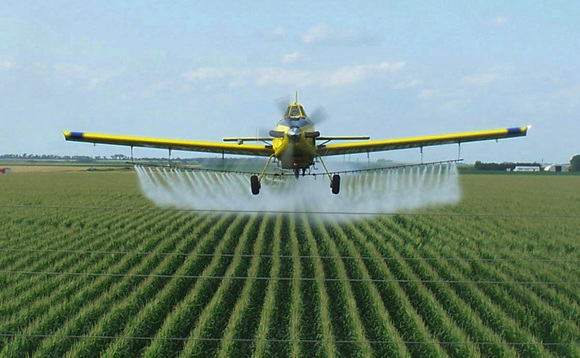The UN has called for urgent action to address the damaging impacts of chemicals on the environment, human health, and economies at a summit this week in Nairobi.
The $5tr dollar global industry is expected to double production by 2030 and countries not expected to meet internationally-agreed goals to minimise the adverse impacts of chemicals and waste by 2020, UN Environment warned in its Global Chemicals Outlook yesterday.
Chemicals used in food and farming are harming wildlife around the world, it adds. Pesticides have been found to negatively impact pollinators, while excess use of phosphorus and nitrogen in agriculture continues to kill ocean life and chemicals used in sunscreen put pressure on coral reef ecosystems.
They also pose a threat to human health. Some antimicrobials, heavy metals and disinfectants exacerbate human resistance to antibiotics, according to the report. The World Health Organisation has estimated the burden of disease from selected chemicals at 1.6 million lives in 2016, but this is “likely an underestimate”, it said.
The body called for for renewed global efforts to prevent further damage from chemicals pollution. Despite agreeing in 2002 to work to curb the threat, hazardous chemicals continue to be released to the environment “in large quantities”, and they are now “ubiquitous” in air, water, soil, food and humans, the UN declared.
But the report said solutions already exist to ensure more sustainable chemicals production, and estimated the economic benefits of minimising negative impacts of chemicals pollution are “in the high tens of billions of US dollars annually”.
Meanwhile, thanks to increasing regulatory action from governments on many chemicals, as well as better supply chain management from companies and growing consumer demand for safer and more environmentally-friendly products, there is a “window of opportunity” to drive change, the UN said.
Countries must develop a global framework to ensure sound management of chemicals and waste from 2020 and beyond, it said.
“Whether the growth in chemicals becomes a net positive or a net negative for humanity depends on how we manage the chemicals challenge,” said Joyce Msuya, acting Executive Director of UN Environment. “What is clear is that we must do much more, together.”
The report found that while international treaties and voluntary initiatives to date have helped reduce the environmental risks associated with some chemicals and wastes, overall progress “has been uneven and implementation gaps remain”.
However, opportunities exist for investors, retailers, producers, academics, and policymakers to scale up initiatives and technologies to tackle the damaging impact of chemical pollution as the global sector gears up for rapid growth over the next decade.
“Given the critical role of the sound management of chemicals and waste in halting biodiversity loss, facilitating access to clean energy and achieving other Sustainable Development Goals and targets, opportunities exist to create synergies with these and other international policy agendas,” UN Environment added.























